|
|
|
Sort Order |
|
|
|
Items / Page
|
|
|
|
|
|
|
| Srl | Item |
| 1 |
ID:
192044
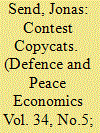

|
|
|
|
|
| Summary/Abstract |
Participants in an innovation contest may steal their opponents’ ideas to enhance their chance of winning. To model this, I introduce the ability to copy another player’s effort in a Tullock contest between two players. I characterise the unique equilibrium in this game dependent on the cost of copying and one of the players’ productivity advantage. If the cost of copying is low, the less productive player is more likely to win the contest. The model’s comparative statics have important implications for governments who subsidise firms in contests and for contest designers.
|
|
|
|
|
|
|
|
|
|
|
|
|
|
|
|
| 2 |
ID:
192040
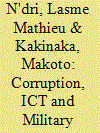

|
|
|
|
|
| Summary/Abstract |
It has been argued that large military spending is often a crucial constraint in Sub-Saharan Africa (SSA) countries, and high corruption has enabled these countries to keep such large military spending. One possible remedy is to promote information and communication technology (ICT), which may cause the anti-corruption policies to become more effective in increasing transparency for the public and reducing unnecessary and abusive military spending. This study discusses the nexus among corruption, military spending, and ICT with a panel data of 48 SSA countries from 2003 to 2015. Our analysis reveals that when ICT prevails, military spending is negatively associated with the control of corruption, so that anti-corruption policies with the usage of ICT could reduce the extravagant budget allocation to military spending. Policymakers should associate sound ICT policy with traditional anti-corruption factors to bring more transparency and less corrupt behaviors in the military department. The reduction in the misuse of military allocation enables the country to increase nonmilitary public spending to face sustainable development challenges for the sake of the population.
|
|
|
|
|
|
|
|
|
|
|
|
|
|
|
|
| 3 |
ID:
192041


|
|
|
|
|
| Summary/Abstract |
warfare. Oxen have been looted and killed, farm inputs and tools destroyed by Ethiopian and Eritrean soldiers. Farmers felt vulnerable out in the open with their oxen. To produce, farmers evaluated risks involved with ploughing and organised lookouts. Overall, a large part of the land had been tilled in difficult conditions, and crops sown that require minimal management, without fertiliser, what led to low yields. True Colour Composite images, produced from Sentinel satellite imagery show that smallholder irrigation schemes were operational. There was a shift from commercial crops to cereals. The situation in western Tigray was particular, as there has been ethnic cleansing of the population and often the 2020 rainfed crops had even not been harvested. Overall, our findings show that the Tigrayan smallholder farming system is resilient, thanks to community self-organisation, combining common strategies of agrarian societies in wartime: spatio-temporal shift in agricultural activities to avoid the proximity with soldiers and shifts in crop types. Rather unique is the relying on communal aid, while the blockade of the Tigray region made that outmigration and off-farm income were no options for the farmers.
|
|
|
|
|
|
|
|
|
|
|
|
|
|
|
|
| 4 |
ID:
192039
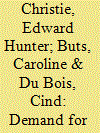

|
|
|
|
|
| Summary/Abstract |
We explore the possibilities and limitations of models of the demand for military expenditures, as against additional kinds of cross-country analyses, with an empirical focus on the Indo-Pacific region. Our research bridges a gap between the Defence Economics and International Relations literatures by developing testable security alignment hypotheses and by testing these hypotheses in three ways: with demand modelling on total expenditures, with analyses on estimated stocks of imported armaments, and with qualitative analyses of trends in defence cooperation between states. We find consistent evidence across research methods of an increase in threat perceptions towards China since around 2012 and of balancing behaviour by US allies and by two non-allies. As compared to standard demand modelling, our hypothesis-based mixed methods approach allows for a clearer treatment of samples with mixed and shifting security alignments and of states that stabilise or reduce expenditures in the face of rising threat perceptions.
|
|
|
|
|
|
|
|
|
|
|
|
|
|
|
|
| 5 |
ID:
192037
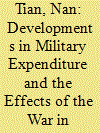

|
|
|
|
|
| Summary/Abstract |
This article presents on trends in military spending, building on the most recent military expenditure data by the Stockholm International Peace Research Institute (SIPRI). World military spending grew for the eighth consecutive year in 2022, up 3.7 per cent to an all-time high of $2240 billion. The increase in world spending in 2022 was largely due to three factors: Russia’s invasion of Ukraine; the increase in military spending by Central and Western Europe countries as a reaction to the invasion and expenditure rises in major powers in Asia, namely China, India and Japan. There were two major military expenditure related developments in 2022 linked to the war in Ukraine. Firstly, Central and Western European responded to the deteriorating security situation by announcing plans to substantially increases their military spending. Some of the acutest increases in military spending took place in countries with close geographical proximity to Russia and Ukraine. Secondly were the immediate and record levels of military aid sent to Ukraine. Based on official figures for the largest donors and other assistance funds, at least $30 billion worth of military aid was given to Ukraine in 2022, with the US as the largest provider accounting for around two-thirds of all military aid
|
|
|
|
|
|
|
|
|
|
|
|
|
|
|
|
| 6 |
ID:
192043
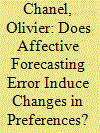

|
|
|
|
|
| Summary/Abstract |
This paper investigates how affective forecasting errors (A.F.E.s), the difference between anticipated emotion and the emotion actually experienced, may induce changes in preferences on time, risk and occupation after combat. Building on psychological theories incorporating the role of emotion in decision-making, we designed a before-and-after-mission survey for Danish soldiers deployed to Afghanistan in 2011. Our hypothesis of an effect from A.F.E.s is tested by controlling for other mechanisms that may also change preferences: immediate emotion, trauma effect – proxied by post-traumatic stress disorder (P.T.S.D.) – and changes in wealth and risk perception. At the aggregate level, results show stable preferences before and after mission. We find positive A.F.E.s for all three emotions studied (fear, anxiety and excitement), with anticipated emotions stronger than those actually experienced. We provide evidence that positive A.F.E.s regarding fear significantly increase risk tolerance and impatience, while positive A.F.E.s regarding excitement strengthen the will to stay in the military. Trauma has no impact on these preferences.
|
|
|
|
|
|
|
|
|
|
|
|
|
|
|
|
| 7 |
ID:
192038
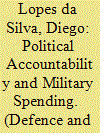

|
|
|
|
|
| Summary/Abstract |
Over the past two decades, evidence on the relationship between democratization and reductions in military spending has accumulated. This association has proven to be robust to a wide variety of specifications and samples. Nevertheless, there remain two important gaps in our understanding of this relationship. Firstly, while most studies argue that democratic political institutions constrain the incumbents’ power to allocate resources to the military, there is still disagreement about which institution. Second, empirical evidence on causality is very scarce. Endogeneity remains a difficult problem to grapple with. To address these issues, I specify a clear set of channels of interaction linking democratic political institutions to military spending. Following previous work, I also argue that political accountability constrains allocations to the military. However, I distinguish three types of accountability: horizontal, vertical and diagonal. I find that diagonal accountability is the strongest mechanism. Furthermore, I use a country’s accumulated experience with political accountability as an instrumental variable to tackle the endogeneity between political accountability and military spending. I find evidence suggesting that political accountability causes military spending as a share of GDP to fall.
|
|
|
|
|
|
|
|
|
|
|
|
|
|
|
|
| 8 |
ID:
192042


|
|
|
|
|
| Summary/Abstract |
What is the causal impact of terrorism on immigration policy preferences? Under what circumstances and due to which psychological micro-mechanisms does this impact materialize? To answer these questions, we provide evidence from pre-registered and well-powered experiments for Germany and the United Kingdom. We find that anti-immigration responses to terrorism follow an emotional proximity rationale: terrorism leads to more restrictive migration policy preferences only among individuals with high levels of perceived insecurity, especially when terrorism occurs in their own country. Policy preferences are not affected by terrorism abroad or by information cues on the objectively low probability of being victimized.
|
|
|
|
|
|
|
|
|
|
|
|
|
|
|
|
|
|
|
|
|